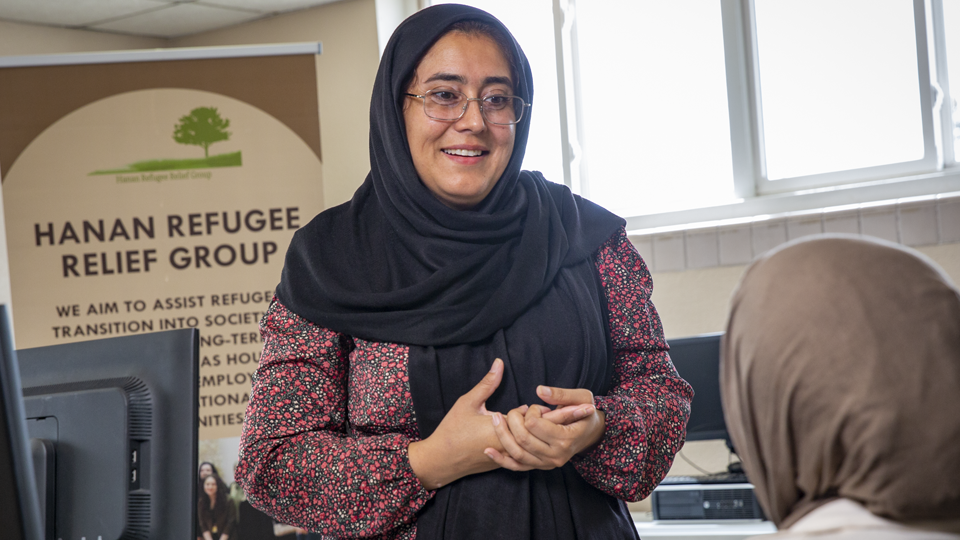
Maryam Durani at Hanan Refugee Relief Center
Maryam Durani is used to attracting attention. Hillary Clinton called her fearless. Michelle Obama draped a medal around her neck. Time magazine declared her one of the world’s most influential people in 2012. In Afghanistan, the ruling Taliban government tried to kill her — twice.
Kandahar, Afghanistan, 2003-2021
Born in Iran to Afghan refugees, Durani and her family moved to Afghanistan when she was 18. She lived in Kandahar, about eight hours south of the Afghan capital of Kabul. The Kandahar province is often called the spiritual home of the Taliban, the group that ruled most of Afghanistan from 1996 through 2001, and once again controls the country.
Her father, an art professor, often spoke out about politics. Her mother routinely shared the family’s home with refugees, offering them food and blankets. Durani — who called Marie Curie one of her early role models — graduated from the Payame Noor and American University of Afghanistan with degrees in law, political science and business.
Durani, 37, also became a leader in the fight for women’s rights in Afghanistan.
At 21, Durani became a member of the Kandahar Provincial Council and served a second term four years later. She was one of only four women on the council. She also founded the Kandahar Women’s Advocacy Network, started a women’s internet cafe, a women’s library, a fitness center for women, and opened the nation’s first women’s radio station.
The Taliban threatened her many times for being an unapologetic and outspoken advocate for women in a society where women are expected to be submissive. Twice the group attempted to assassinate her, she said. The international community, however, praised her. In 2012, she won the International Women of Courage Award. Durani received her honor from then-First Lady Michelle Obama and then-Secretary of State Hillary Clinton.
In September 2021, the U.S. military left Afghanistan for good and the nation became the Islamic Emirate of Afghanistan. When the Taliban seized Kabul, Durani fled and became one of 76,000 Afghans who relocated to the United States.
Milwaukee, 2022
The Hanan Refugee Relief Center occupies the upstairs of a squat, cream-brick building on busy South Howell Avenue on Milwaukee’s south side. On a cold March day, a mix of rain and snow pelted the second-story windows while the center hummed with activity.
Women who had recently arrived from Afghanistan were learning English. Children were laughing in a nearby playroom. Volunteers were making sure people had rides home. And in the middle of it all, a group of Afghan women hovered around Durani, chatting and asking her to translate for them.
After spending several months in Fort McCoy in central Wisconsin, Durani, her father and her two brothers now call Milwaukee home.
“Many people left their families behind, left their friends behind. There, they were afraid of war. Here, they are afraid of the unknown. I just want to help,” she said.
Durani took MATC classes to strengthen her English skills, along with volunteering at the Hanan Refugee Relief Center. MATC has partnered with the center to provide English as a Second Language (ESL) classes to refugees who speak the prevalent languages of Afghanistan: Pashto, Dari and Urdu.
“She has served as an excellent mentor and role model to my students. She interprets for the vast majority of Afghans locally and is already involved with various communitybased organizations,” said Bara Omari, instructional chair of MATC’s ESL program.
“She’s very inspirational,” said Sheila Badwan, vice president of the Hanan Refugee Relief Center - Wisconsin Chapter, which helps refugees transition into their new communities by providing housing, food, medical relief, education and employment.
“A lot of women look up to her. I know there are many women in Afghanistan who miss her very deeply,” Badwan added.
Although grateful to experience peace after years of war and strife, Durani often thinks about what will become of the country she left behind.
“Now that the fighting is over, the country needs educated and skilled people, but there is no one left. Those people are gone,” she said. “The Taliban also needs money and all the people to agree on what they want to do. The Taliban has neither.”
The Taliban continually insists that it will create an inclusive government that protects the rights of women and ethnic minorities, but instead the Taliban is trying to convince Afghans that girls and women don’t need to attend school or have jobs, Durani said.
“They talk, but they don’t show,” Durani said. “It’s important that the international community stay focused on what is happening there.”
If the Taliban fails to make life better for all Afghans, Durani fears she might never see her homeland again.
“If there ever becomes a good situation, I would return,” she said. “Afghanistan is my country. It’s my home, it’s my work. I have everything there, so of course I would go back. But I think that I will be here in this country for a long time.”
Find out more about MATC’s partnerships with community based organizations at matc.edu/esl.
